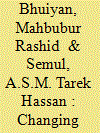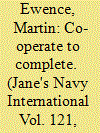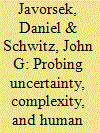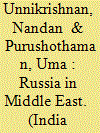|
|
|
Sort Order |
|
|
|
Items / Page
|
|
|
|
|
|
|
| Srl | Item |
| 1 |
ID:
167800


|
|
|
|
|
| Summary/Abstract |
The nature and means of conducting warfare have always been changing. Technology, political realities and ideologies continue to play crucial role in this transformation as witnessed in the two world wars, the Cold War, and in following decades. Non-state actors became more visible and important. Nowadays, many wars involve such actors against state parties, for example, the US global war on terror, Israel-Hezbollah War (2006) and the current war against the Islamic State (ISIL). The term hybrid war involves a combination of traditional and nonconventional means, has become a common subject of discussion. But hybrid war is nothing new and has been practiced since ancient times. Several countries have now resorted to hybrid war: one such country is Russia, who has been blamed by western countries in this regard, e.g., in Georgian War (2008), Crimea (2014), ongoing conflict in eastern and south Ukraine, disinformation campaign against the West and interference in their governance process. Russia similarly, blames them for its destabilization by increased military presence on its borders and inciting revolutions in neighbour countries. Meanwhile, countries are developing hybrid warfare capacities, including plans for deploying military robots. Non-state actors now also use hybrid means like the Hezbollah or ISIL and several ongoing wars are becoming growingly hybrid; besides, the clash of ideologies, i.e., religious radicalism vs. white supremacism can create conflicts, indicating future wars may be even more so. Yet, some old mechanisms and strategies are likely to remain relevant and useful in future wars as well, suggesting their true ever-evolving and hybrid character.
|
|
|
|
|
|
|
|
|
|
|
|
|
|
|
|
| 2 |
ID:
150272


|
|
|
| 3 |
ID:
133415


|
|
|
|
|
| Publication |
2014.
|
| Summary/Abstract |
Geopolitical dynamics associated with nuclear proliferation, the Arab Spring, the rapid rise of Chinese power, an oil-fueled Russian resurgence, and the post-Afghan and Iraq eras will demand significant changes in intelligence focus, processes, and resources. Nearly a decade after intelligence failures required a restructuring of the Intelligence Community with mandates for a scientific approach to intelligence analysis, current efforts continue to focus on overly deterministic individual analyst methods. We argue for a process-oriented approach to analysis resembling the collaborative scientific process successful in other professions that is built on shared theory and models. After demonstrating that events in the real world are path dependent and contingent on deterministic and random elements, we highlight the role of uncertainty in intelligence analysis with specific emphasis on intelligence failures. We then describe how human agency in an interconnected and interdependent system leads to a landscape of dancing strategies as agents dynamically modify their responses to events. Unfortunately, the consequences of the present deterministic intelligence mindset are significant time delays in adjusting to emerging adversaries leading to an increased susceptibility to intelligence failures. In contrast with the existing analyst-centric methods, we propose a risk management approach enhanced by outside collaboration on theory and models that embrace lessons from the twentieth-century science of uncertainty, human agency, and complexity.
|
|
|
|
|
|
|
|
|
|
|
|
|
|
|
|
| 4 |
ID:
153096


|
|
|
|
|
| Summary/Abstract |
Russia has re-emerged as a major player in the Middle East once again, mainly because of its military intervention in the Syrian civil war in September 2015. This article throws light on Russia’s civilizational links with the region and what its aims in the region have been over the years, including the during Cold War. While Russia’s foreign policy towards the Middle East was passive in the tumultuous years following the fall of the Soviet Union, over the last few years, it has begun reorienting and recalibrating its policy towards the region. This article discusses Russia’s current aims in the region and its global ambitions, linking these to its intervention in the Syrian civil war, paying particular attention to the close ties that Russia has with Syria. This article attempts to explore whether Russia’s presence in the region is sustainable. It also explains the consequences of Russia’s intervention for the region and for Russia itself.
|
|
|
|
|
|
|
|
|
|
|
|
|
|
|
|
|
|
|
|
|